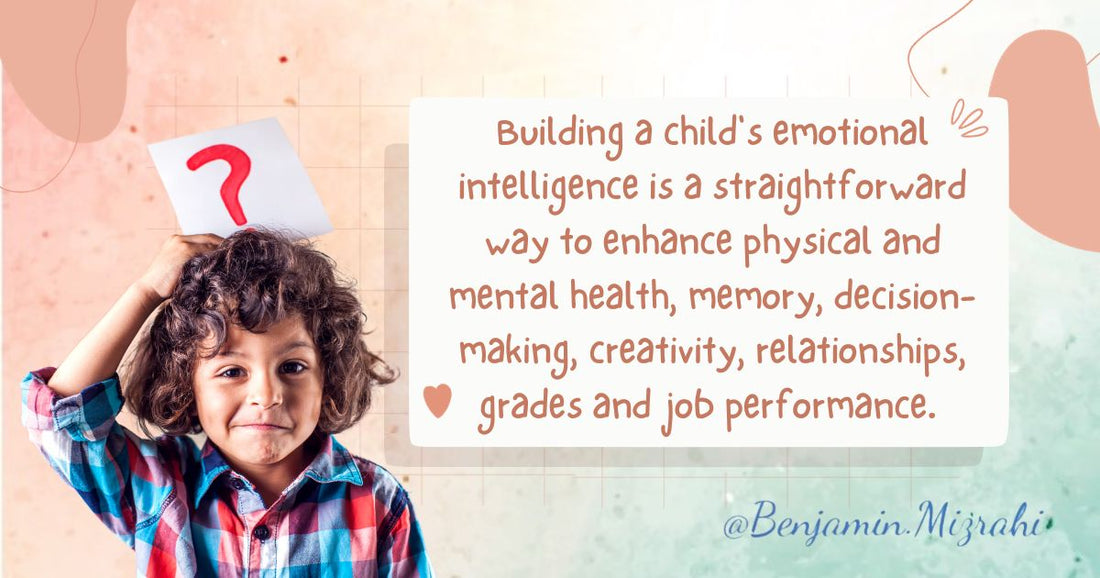
Ways to Boost Your Child’s Emotional Intelligence
Share
Help your child become happier, more confident, and more empathetic by teaching them healthy ways to express their feelings.
Amid worrying about our kids’ academic success, it’s easy to lose sight of their emotional development. But research suggests a child’s emotional intelligence is every bit as important as reading, writing, and ‘arithmetic. Why? Because kids with a high emotional intelligence have mastered the other three Rs: responsibility, resilience, and respect.
Since they’ve developed more coping skills, these kids are more able to control their emotions and behavior when things don’t go their way. This in turn makes them happier, more self-confident, and more respectful of others. Not surprisingly, children with a high EQ (or emotional quotient) also tend to do better in school. They pay attention, easily take in information, stay motivated, and get along with teachers and classmates.
Is this just a matter of inborn temperament? Perhaps in some cases, yes. But research shows emotional intelligence can be taught. Students who have gone through school-based EQ training average 11 percentile points higher on academic test scores. As a parent, you can also teach your kid to handle challenging emotions like anger, sadness, and frustration. From books and toys to family games, here are five creative ways to help your child become an EQ whiz kid.
👉 Play the “What-if” game
During family car rides or as a conversation starter at the dinner table, the “What would you do if…?” game gets kids thinking about ways to respond to different situations. Ask questions that encourage your child to behave with more emotional smarts: “What would you do if you saw someone grab a toy away from your friend? Or if I blamed you for something you didn’t do? Or if your brother hit you for no reason?”
Asking these questions when emotions aren’t running high gives your child a chance to come up with ideas on how to best respond – and for you to offer some ideas of your own. Since you can tailor questions to fit your child’s age, this works for younger and older kids alike.
👉 That’s emo-tainment!
Don’t tell the kids, but books and movies can be more than just entertainment. San Francisco-based childhood social skills teacher Dominique Baudry says that reading books and watching movies with children present ideal opportunities to talk about emotions and behavior. ” When reading together, ask your child, ‘What do you think he’s feeling?’ Talk about a character’s motive and intention. ‘Why do you think he did that?””
Similarly, after watching a movie together, ask your child why a character was angry, frustrated, sad, or excited. These conversations all present an opportunity to expand “emotional literacy,” so that children get used to talking about why people behave the way they do and how they might have responded differently. What’s more, doing this with make-believe characters makes it that much easier for kids to be emotionally fluent when talking about their own emotions – which is the whole idea.
👉 Read it with feeling
Not only can you use stories as a launching pad to discuss feelings, but you can also get books that address emotions directly. One of the best “I’m feeling bad!” books for young kids: When Sophie Gets Angry – Really Really Angry. As happens with many children, Sophie’s anger is too much for her and her family: She rages, kicks, and screams. To find her way out of her overwhelming emotions, Sophie takes time to be alone and calm down, then returns to her family more cheerful and encouraged.
👉 Give everyone a do-over
Admit it: When parents – and kids – get angry enough, they yell or throw tantrums. Angry outbursts make everyone in the family feel terrible and usually solve nothing. It is recommended that all family members should be allowed a chance to have a “do-over.”
Anyone in the family is allowed to say, ‘That came out really mean. I’m going to do a do-over. Here’s what I wanted to say.’ Do-overs allow kids and grownups a way to gain more self-awareness by practicing less hurtful ways of expressing difficult emotions. Allowing for do-overs lets the whole family help one another try again in a kinder, better way. It’s also a very kind way to cut each other some slack.
👉 Work on playing
With less free playtime at and after school, kids today have fewer chances to practice the social skills that are important for learning emotional intelligence and dealing with difficult issues like bullying. Give your child as many opportunities as possible for unstructured, cooperative and imaginative play with siblings and other kids. Building a fort, putting on a play or a variety show or playing ‘restaurant’ or ‘barber shop’ together give kids lots of opportunities to practice communicating their desires and resolving conflicts.
As your child grows older, talk about real-life situations—whether it’s things they’re encountering in their daily life or it’s a problem you’re reading about in the news. Make it an ongoing conversation. Use your child’s mistakes as opportunities to grow better. When they act out because they’re angry or they hurt someone’s feelings, take time to talk about how they can do better in the future. With your ongoing support and guidance, your child can develop the emotional intelligence and mental strength they’ll need to succeed in life.
